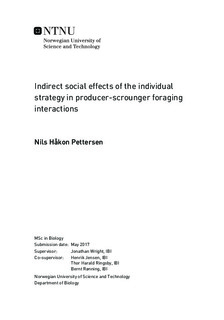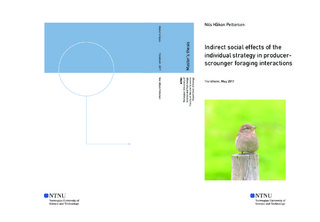| dc.description.abstract | When animals interact socially they experience and react to phenotypes of their social partners. Such interactions can affect behaviours and fitness, and therefore opponent effects (i.e. indirect social effects) can maintain or prevent the existence of certain phenotypes in a population. In this study, I repeatedly assayed individual producer-scrounger behaviour in house sparrows (Passer domesticus) in both group- and pair-wise assays, to be able to assess indirect effects in whether different opponents affect the behaviour of focal individuals, and to what magnitude. I show repeatable individual differences in feeding behaviour, and that individuals behaved consistently across the group- and pair-wise contexts. However, I found no evidence for repeatable social environment effects, most likely due to high abundance and availability of food, causing scrounging rates to be low. This study therefore suggests that dividing naturally flock-feeding individuals into pairs is an effective way of assessing individual variation in social behavioural responses to individual partners, and the profitability of different foraging and social strategies. | |

